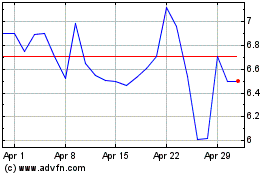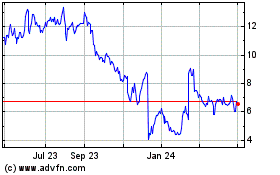Cogent Biosciences, Inc. (Nasdaq: COGT), a biotechnology
company focused on developing precision therapies for genetically
defined diseases, today announced updated preclinical data from the
Company’s pipeline programs, including its novel EGFR-sparing
brain-penetrant ErbB2 inhibitor and its next-generation selective
fibroblast growth factor receptor 2 (FGFR2) program. The data are
being presented today in poster sessions at the American
Association for Cancer Research (AACR) 2023 Annual Meeting. Cogent
also announced the initiation of Part 2 of the Company’s ongoing
APEX trial with bezuclastinib in Advanced Systemic Mastocytosis
(AdvSM).
“We are pleased to share our progress highlighting the Cogent
Research Team in their ongoing effort to discover and advance
potential best-in-class novel therapies for rare disease
populations with high unmet medical need,” said Andrew Robbins,
Cogent’s President and Chief Executive Officer. “Separately, based
on bezuclastinib’s impressive and consistent clinical activity,
safety and tolerability, we are also excited to announce the
initiation of Part 2 of the APEX trial in AdvSM at a once-daily
dose of 150 mg. We remain on track to provide clinical updates in
the second half of 2023 from both APEX and SUMMIT, our trial of
bezuclastinib in NonAdvSM patients, as well as updated clinical
results from the PEAK lead-in trial in GIST patients this
quarter.”
AACR Poster Details
Title: Identification of a novel EGFR
sparing brain penetrant ErbB2 inhibitor with activity against
oncogenic ErbB2 mutationsSession
Category: Molecular/Cellular Biology and
GeneticsSession Title: Cell Cycle
Progression, Checkpoint, and TelomeresSession Date and
Time: Monday Apr 17, 2023 9:00 AM - 12:30 PM
ETLocation: Poster Section 10Poster
Board Number: 21Published Abstract
Number: 1440
Cogent is developing a potential best-in-class EGFR-sparing,
brain-penetrant ErbB2 inhibitor that includes coverage of key
mutations (YVMA, S310F, V842I, L755S) inadequately addressed by
currently approved therapies. Activating mutations in the ErbB2
gene have been identified in multiple cancers and demonstrate a
tumorigenic role similar to that of ErbB2 amplification. The poster
presented today describes a series of novel compounds which
potently inhibit several key ErbB2 mutations, including YVMA
insertions, while sparing inhibition of EGFR. An exemplar compound
from these series demonstrates advantages versus tucatinib, an
approved benchmark compound, on tumor growth inhibition in a
peripheral ErbB2 L755S driven mutant model, as well as in an ErbB2
driven intracranial model. Recent program advances with a
novel chemotype have further improved ErbB2 mutational potency and
selectivity, increased estimated brain penetrance to 40% and
improved human whole blood stability to nearly 24 hours, suggesting
a favorable profile for optimal clinical efficacy.
Title: In vivo characterization of a
selective FGFR2 inhibitor with potency against gatekeeper and
molecular brake mutationsSession
Category: Molecular/Cellular Biology and
GeneticsSession Title: Cell Cycle
Progression, Checkpoint, and TelomeresSession Date and
Time: Monday Apr 17, 2023, 9:00 AM - 12:30 PM
ETLocation: Poster Section 10Poster
Board Number: 20Published Abstract
Number: 1439
FGFR inhibitors are well-established oncogenic drivers in
multiple diseases, but approved medicines fail to capture the full
landscape of FGFR altered tumor types, with FGFR1-mediated
hyperphosphatemia serving as the most common dose-limiting toxicity
for pan-FGFR inhibitors. The poster presented today provides the
first published evidence of a reversible, selective FGFR2 inhibitor
with coverage of activating and emerging resistance mutations that
spares inhibition of FGFR1. Preclinical data demonstrate a
profile that delivers equipotent coverage across both key
gatekeeper and molecular brake mutations (V564X, N549X) in FGFR2,
while avoiding any evidence of FGFR1-linked hyperphosphatemia at
efficacious plasma concentrations. In addition, as a
reversible inhibitor, the Cogent program retains enzymatic potency
against potential cysteine 491 mutations which are known to emerge
as key resistance mutations in patients treated with covalent
inhibitors.
APEX Part 2 Design Highlights
APEX is an ongoing Phase 2 trial evaluating bezuclastinib in
patients with AdvSM. Part 2 will enroll approximately 65 patients
treated at a once-daily 150 mg optimized dose and if successful, is
designed to support regulatory submission. Enrollment is expected
to be complete by the end of 2024. Several additional patient
cohorts are anticipated during Part 2 of the APEX trial designed to
demonstrate the breadth of AdvSM patients who may benefit from
bezuclastinib, including:
- Up to 20 patients with systemic mastocytosis with an associated
hematologic neoplasm (SM-AHN) treated concomitantly with
bezuclastinib and AHN directed therapies, including
azacitidine.
- Up to 15 patients with inevaluable mIWG disease without
C-findings.
- Approximately 10 patients at a dose of 300 mg once-daily to
explore the effect of exceeding IC90 KIT D816V engagement in AdvSM
patients.
The predicted clinical exposure of the optimized 150 mg
formulation of bezuclastinib is expected to surpass that of the
previous formulation of bezuclastinib dosed at 100 mg twice-daily
in APEX Part 1. Clinical data from approximately 30 patients from
APEX Part 1 will be included in a presentation at a scientific
meeting in the second half of 2023. Currently, clinical activity,
safety and tolerability of patients dosed in APEX Part 1 remains
consistent with results presented at the 64th American Society of
Hematology (ASH) meeting in December 2022.
About Cogent Biosciences, Inc.Cogent
Biosciences is a biotechnology company focused on developing
precision therapies for genetically defined diseases. The most
advanced clinical program, bezuclastinib, is a selective tyrosine
kinase inhibitor that is designed to potently inhibit the KIT D816V
mutation as well as other mutations in KIT exon 17. KIT D816V is
responsible for driving systemic mastocytosis, a serious disease
caused by unchecked proliferation of mast cells. Exon 17 mutations
are also found in patients with advanced GIST, a type of cancer
with strong dependence on oncogenic KIT signaling. In addition to
bezuclastinib, the Cogent Research Team is developing a portfolio
of novel targeted therapies to help patients fighting serious,
genetically driven diseases initially targeting FGFR2 and ErbB2.
Cogent Biosciences is based in Waltham,
MA and Boulder, CO. Visit our website for more
information at www.cogentbio.com. Follow Cogent
Biosciences on social media: Twitter and LinkedIn.
Information that may be important to investors will be routinely
posted on our website and Twitter.
Forward-Looking StatementsThis press release
contains forward-looking statements within the meaning of the
Private Securities Litigation Reform Act of 1995, including, but
not limited to, statements regarding the potential advantages of
the Company’s preclinical ErbB2 and FGFR programs, the Company’s
plans to present clinical data from its Phase 3 PEAK lead-in study
in GIST patients in the second quarter of 2023, the Company’s plans
to present clinical data from its SUMMIT trial in NonAdvSM patients
in the second half of 2023, the Company’s plans to present updated
clinical data from Part 1 of its APEX trial in AdvSM patients in
the second half of 2023, and clinical development plans and
timelines for the Company’s APEX trial, including anticipated
enrollment, additional patient cohorts, and the anticipated
clinical exposure of the optimized 150 mg formulation of
bezuclastinib. The use of words such as, but not limited to,
"anticipate," "believe," "continue," "could," "estimate," "expect,"
"intend," "may," "might," "plan," "potential," "predict,"
"project," "should," "target," "will," or "would" and similar words
expressions are intended to identify forward-looking statements.
Forward-looking statements are neither historical facts nor
assurances of future performance. Instead, they are based on our
current beliefs, expectations and assumptions regarding the future
of our business, future plans and strategies, our clinical results,
the rate of enrollment in our clinical trials and other future
conditions. New risks and uncertainties may emerge from time to
time, and it is not possible to predict all risks and
uncertainties. No representations or warranties (expressed or
implied) are made about the accuracy of any such forward-looking
statements. We may not actually achieve the forecasts or milestones
disclosed in our forward-looking statements, and you should not
place undue reliance on our forward-looking statements. Such
forward-looking statements are subject to a number of material
risks and uncertainties including but not limited to those set
forth under the caption "Risk Factors" in Cogent's most recent
Annual Report on Form 10-K filed with the SEC, as well as
discussions of potential risks, uncertainties, and other important
factors in our subsequent filings with the SEC. Any
forward-looking statement speaks only as of the date on which it
was made. Neither we, nor our affiliates, advisors or
representatives, undertake any obligation to publicly update or
revise any forward-looking statement, whether as result of new
information, future events or otherwise, except as required by law.
These forward-looking statements should not be relied upon as
representing our views as of any date subsequent to the date
hereof.
Investor Contact:Christi WaarichSenior
Director, Investor
Relationschristi.waarich@cogentbio.com617-830-1653
Cogent Biosciences (NASDAQ:COGT)
Historical Stock Chart
From Nov 2024 to Dec 2024

Cogent Biosciences (NASDAQ:COGT)
Historical Stock Chart
From Dec 2023 to Dec 2024
